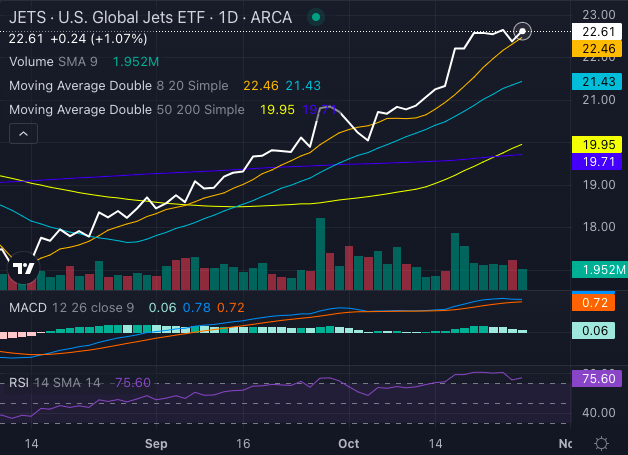The U.S. Global Jets ETF JETS is soaring, up 51.65% over the past year, powered by strong gains in its top holdings, including Delta Air Lines Inc DAL and Southwest Airlines Co LUV.
The ETF just made a Golden Cross, a bullish signal signaling more upside ahead.

Chart created using Benzinga Pro
The 50-day simple moving average (SMA) at $19.95 has crossed above the 200-day SMA at $19.71, triggering a bullish trend.
As travel demand rebounds, the airline industry is riding high. But as we head into the final quarter of 2024, can the sector maintain altitude with looming challenges ahead?
Read Also: Delta Air Lines Soars With A Golden Cross: New Cabins, New Heights
JETS ETF Soars, Backed by Airline Giants
The JETS ETF, with Delta and Southwest among its top holdings, has been a high-flyer in 2023. It’s up 20.33% year-to-date, supported by United Airlines Holdings Inc UAL stellar performance.
United recently hit a 52-week high after posting strong third-quarter earnings, which exceeded expectations with $3.33 per share and $14.84 billion in revenue.
Despite some turbulence, including a slight dip in revenue per available seat mile (RASM), United’s future outlook remains optimistic with solid free cash flow of $3.4 billion year-to-date.
With a strong 83.64% year-to-date rise in United’s stock price, investors in the JETS ETF have been smiling, but the road ahead could get bumpy for other airline stocks like Delta and Southwest.
Delta Battles Headwinds After Outage
Delta Air Lines has had its fair share of turbulence lately. The airline reported that a costly technology outage during the summer, involving cybersecurity companies CrowdStrike Holdings Inc CRWD and Microsoft Corp MSFT, wiped out $380 million in revenue.
Despite the hit, Delta posted $15.68 billion in revenue for the third quarter, but it fell short of analysts’ expectations.
Even so, Delta is banking on strong holiday demand to lift its fourth-quarter earnings, projecting revenues to rise between 2% and 4%. But with looming election uncertainty briefly deterring air travel, and its capacity for future tech failures now a concern, can Delta regain momentum?
Southwest Beats Expectations, But Boeing Concerns Linger
Meanwhile, Southwest Airlines posted an unexpected earnings beat in its third quarter report, with 15 cents EPS versus breakeven forecasts. Revenue also surpassed estimates at $6.87 billion, thanks to higher-than-expected travel demand. But despite the positive earnings, Southwest’s stock dipped due to concerns over potential Boeing Co BA delivery delays, adding uncertainty to its future growth.
Southwest also inked an agreement with activist investor Elliott Investment Management, which could lead to further strategic changes. The airline’s cautious tone around Boeing delays may cause some turbulence in the short term, but long-term investors might want to keep their seat belts fastened for future gains.
What’s Next For Airline Investors?
As the fourth quarter unfolds, investors in the JETS ETF and individual airline stocks will be watching closely. Will strong travel demand be enough to offset the headwinds facing Delta and Southwest?
And can the industry’s investments in infrastructure, technology, and partnerships with companies like Microsoft lead to smoother skies in 2025?
With Delta battling outages, Southwest navigating Boeing uncertainties, and United soaring ahead, the airline industry has plenty of drama left in the tank.
For now, it’s time for investors to sit tight and prepare for what could be a bumpy ride ahead.
Read Next:
Image: Unsplash
Market News and Data brought to you by Benzinga APIs
© 2024 Benzinga.com. Benzinga does not provide investment advice. All rights reserved.

